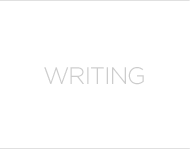Welcome to the first installment online portion of “And,” the performance I’m making to premiere at Abrons Arts Center March 30-April 2, 2017. rehearsal video and an excerpt from something I’ve been reading that relates to the piece. As in the performance, I want the language (quoted, projected, animated, written and/or physical) here to offer ideas, sometimes contradictory, and create associations rather than pin down any one meaning. I post new entries to the top of this page; the page will grow as the performance does.
Lyn Hejinian from “The Rejection of Closure”
“Can form make the primary chaos (the raw material, the unorganized impulse and information, the uncertainty, incompleteness, vastness) articulate without depriving it of its capacious vitality, its generative power? Can form go even further than that and actually generate that potency, opening uncertainty to curiosity, incompleteness to speculation, and turning vastness into plenitude? In my opinion, the answer is yes; that is, in fact, the function of form in art. Form is not a fixture but an activity.”
Paul Valéry, from Analects:
“Two dangers never cease threatening the world: order and disorder.”
Alice Notley in Disobedience:
“my rule for this poem/ is honesty, my other rule is Fuck You”
Louis Bury from Exercises in Criticism:
“Within such a context, constraint, rather than being an unpleasant form of coercion, becomes a helpful mechanism for navigating quantitative overload- becomes, paradoxically, liberating.”
Eileen Myles from The Importance of Being Iceland:
“It simply strikes me that form has a real honest engagement with content and therefore might even need to get a little sleazy with it suggesting it stop early or go too far.”
Maggie Nelson from The Argonauts:
“Before we met, I had spent a lifetime devoted to Wittgenstein’s idea that the inexpressible is contained-inexpressibly!- in the expressed. This idea gets less air time than his more reverential whereof one cannot speak thereof one must be silent, but it is, I think, a deeper idea. Its paradox is, quite literally, why I write, or how I feel able to keep writing.”
Robert Smithson from The Writings of Robert Smithson: Essays with Illustration:
“In the illusory babels of language, an artist might advance specifically to get lost, and to intoxicate himself in dizzying sytaxes, seeking odd intersections of meaning, strange corridors of history, unexpected echoes, unknown humors, or voids of knowledge… but this quest is risky, full of bottomless fictions and endless architectures and counter-architectures… at the end, if there is an end, are perhaps only meaningless reverberations.”
Rebecca Solnit from “Woolf’s Darkness: Embracing the Inexplicable” :
“Filling in the blanks replaces the truth that we don’t entirely know with the false sense that we do. We know less when we erroneously think we know than when we recognize that we don’t. Sometimes I think these pretenses at authoritative knowledge are failures of language: the language of bold assertion is simpler, less taxing, than the language of nuance and ambiguity and speculation.”
Kenny Goldsmith from BOMB Magazine conversation with Wayne Koestenbaum:
“It’s an interesting point. Having come through an art education and now teaching English, here’s what I’ve learned: English students function from the neck up; they don’t have bodies, they just have heads.”
Lyn Hejinian from The Rejection of Closure:
“Writing’s forms are not merely shapes but forces; formal questions are about dynamics—they ask how, where, and why the writing moves, what are the types, directions, number, and velocities of a work’s motion. The material aporia objectifies the poem in the context of ideas and of language itself.”
Helene Cixous:
“A feminine textual body is recognized by the fact that it is always endless, without ending. There’s no closure, it doesn’t stop.”
George Eliot from Daniel Deronda:
“Men can do nothing without the make-believe of a beginning.”
Alice Notley from The Poetics of Disobedience:
“This work is all very disobedient, in a way it picks up where Disobedience left off; but it doesn’t lecture as much or shake its fist so, is less interested in the so called real than in denying its existence in favor of the real real. ”
Shawn Wen:
“Even words are asked to be more than descriptive. They cannot just represent. They cannot sit pretty and let the reader do the work. Even the words try to inhabit. To set a scene. Then the writer is just a wannabe actor. The actor can twist and bend. Now he is a bird. Now he is a flower. Writers must spell it out. F-L-O-W-E-R. And still, it’s just a word. It can’t dance. It can’t run. It can’t fall. You can read it. You can do so much as to pro-nounce it. Try to taste the sibilants as you tap your tongue against your teeth. But you still lack the shape and presence of a body.”


